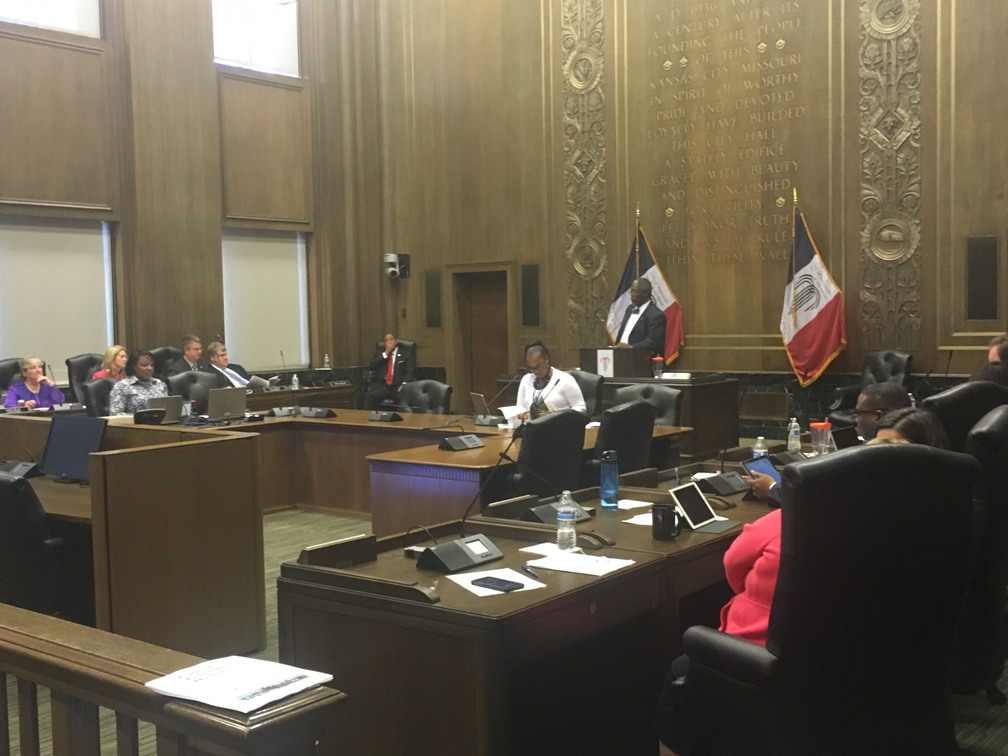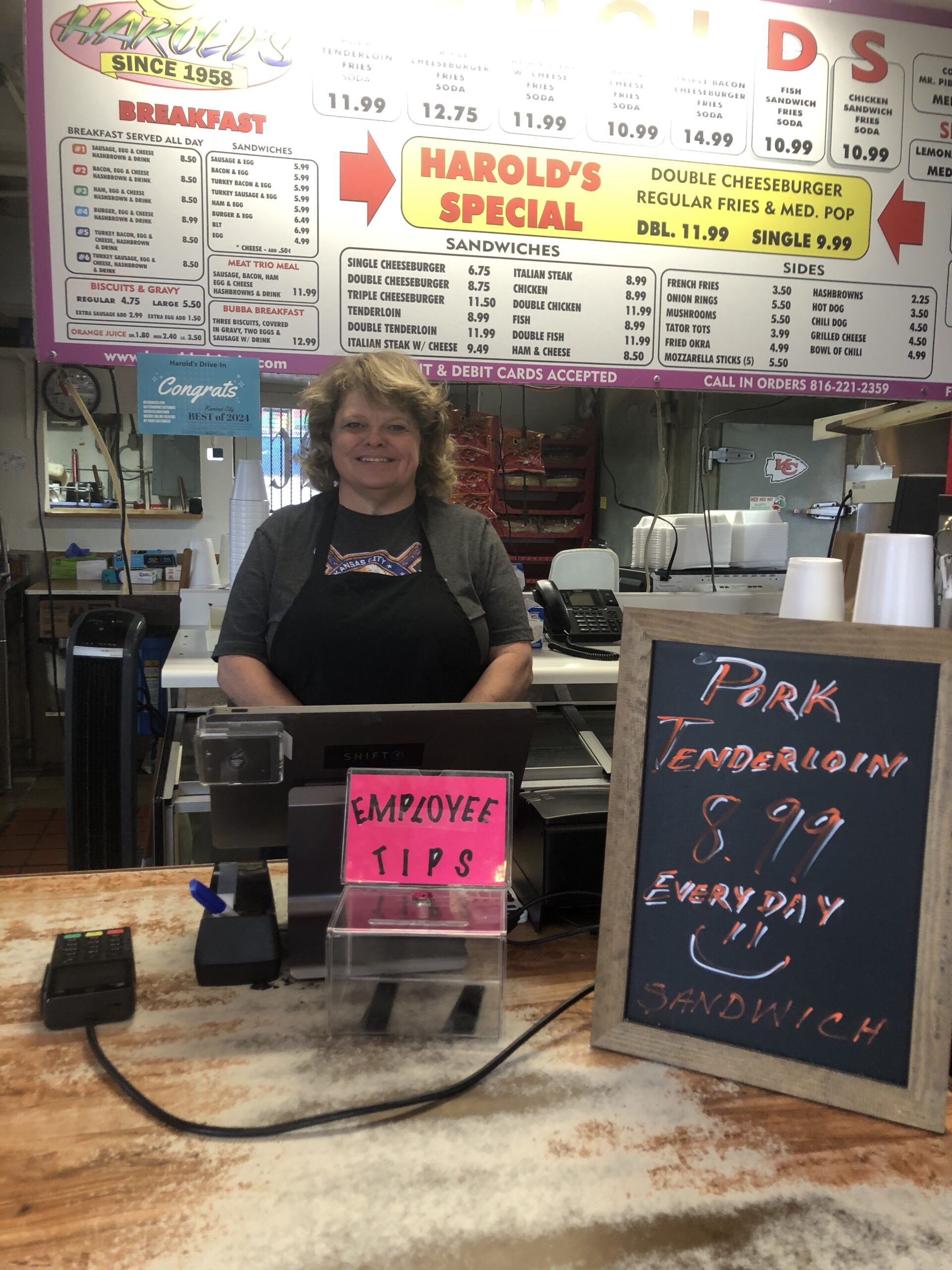Northeast News
March 25, 2017
KANSAS CITY, Missouri – KCPD will have to manage this upcoming fiscal year without an additional $1.7 million, the amount requested of the City last week to finance pay increases for junior officers at the police department.
The KCMO City Council unanimously adopted a $1.59 billion 2017-2018 budget during its legislative session on Thursday, March 23, and the $1.7 million increase was not added to the public safety outlay, which already makes up 76% of the General Fund operating budget. Under the adopted budget, public safety – which largely consists of the police and fire department budgets – will see a $19 million (or 4.6%) increase over the current fiscal year.
In addition, City employees will see a modest raise, basic services will be continued, and water bills will see a lower projected increase than what was called for under the Citywide Business Plan. That plan had originally called for increases of 3% for the water rate and 13% for the sewer rate, but the adopted 2017-2018 budget decreased the rate increase to 1.5% for water and 9.5% for sewer in response to concerns relayed from citizens. The budget, which saw strong support from the City Council, will go into effect on May 1.
“This is probably the smoothest budget that I’ve gone through since I’ve been on City Council,” said 3rd District Councilman Jermaine Reed ahead of the unanimous vote.
The $1.7 million in additional public safety funds were officially requested by 1st District Councilwoman Heather Hall during the Finance and Governance committee meeting on Wednesday, March 22. Hall had hoped the funds would help finance pay raises for young police officers who might otherwise be lured to neighboring police departments with more enticing pay packages.
“My goal is to retain those young officers. We spend a lot of time and money training them,” said Hall. “It’s not going to fix the problem, but it’s going to stop the bleeding.”
Under Hall’s proposal, the additional $1.7 million would have been written into the 2017-2018 budget ahead of its adoption on March 23, but the funds wouldn’t have been made available to the department until November 1, 2017. The logic, according to Hall, was that the City would be able to identify at least $1.7 million in cost savings over the coming months, through the consolidation of services.
“Instead of wanting to rob Peter to pay Paul, I want to find ways moving forward to reduce the budget,” Hall said.
KCMO Budget Officer Scott Huizenga expressed his opinion during the meeting that there are opportunities for consolidation between KCPD and the City of Kansas City.
“With even modest improvements and efficiencies in the two operations, we could save millions of dollars,” said Huizenga. He did acknowledge, however, that the process wouldn’t be completed overnight. “If we started today, I suspect it would be more than a year out. It’s a long-term process to be sure.”
The City’s Director of Finance, Randy Landes, strongly cautioned the committee that the City was already on pace to fall short of its stated fund balance goals for the fiscal year, even before consideration of a budget increase. Landes also warned against making budgetary decisions based off encouraging projections.
“I think you’re still off your plan, and I think you’re off on your fund balance goal,” said Landes.
Members of the Finance and Governance committee expressed a general unwillingness to commit additional budget dollars to public safety, especially without assurances that the funds would indeed go towards raises for young officers. Because the Kansas City, Missouri Police Department is not under local control, exactly how the KCMO budget dollars are expended is a decision ultimately made by the appointed Board of Police Commissioners.
“It’s not like we have not had an increase to the police budget,” said 5th District Councilman Lee Barnes, Jr. “Anything we do with the police, we have virtually no control over how they’re going to spend it.”
4th District Councilwoman Jolie Justus agreed that the measure should be held, adding that she’d like to ensure that any amendments to the budget are legal and enforceable before agreeing to an increase. 6th District Councilman Kevin McManus expressed similar concerns.
“Can the City Manager force the funds to be spent a certain way?” asked McManus. “I think the answer is no.”
The issue of consolidation between the City and KCPD has been a talking point at City Hall since at least 2001, when an audit report concluded that information technology – specifically network installation, maintenance and PC support – showed the most potential for cost savings if the support services were consolidated.
“Consolidating network and PC support between the city and Police Department would provide for short and long-term cost savings, have a relatively limited impact on employees, and would provide a low-risk opportunity to improve communication and build trust between the two entities,” stated a January 2001 City Auditor’s report.
Those measures have yet to be undertaken, leading at least one Councilman to express hesitation at approving funds before some sort of agreement is hatched. Councilman Barnes noted that he’d like assurances from KCPD before moving towards any further increases to the public safety budget.
“First, where do we get these dollars from? I honestly don’t see any consolidation happening within the next year,” said Barnes. “We haven’t had any conversations with the Police Board about any of this.”
After the Finance and Governance meeting, committee chair and 1st District Councilman Scott Wagner articulated why Landes expressed hesitancy to support a budget increase that goes into effect in the middle of the fiscal year. In this case, Wagner noted, the November 1 date to release additional funds would have occurred before the City received property taxes for the year.
“What’s he saying is, ‘I haven’t seen my property taxes come in yet. I may not be in a position to give more at that time,’” said Wagner. “I expect him to be conservative about it, because that’s what makes him good.”
Wagner also discussed the City’s limitations when it comes to defining how budgeted dollars are utilized by the Board of Police Commissioners.
“Based on our system – good, bad, or otherwise – it does not allow us to have the same level of budget certainty with the police department that we have with other departments,” said Wagner.
Ultimately, the request for additional funding was tabled, and the 2017-2018 budget was approved the following day without significant alterations. 2nd District Councilwoman Teresa Loar did indicate on March 23, however, that she would like to keep searching for additional funding in the future.
“The budget is somewhat fluid, and we’ll continue to fight for public dollars and get the money for public safety as we need them,” said Loar. “Public safety is our priority as far as what we do in this city.”
Mayor Sly James – himself a member of the Board of Police Commissioners – agreed with the Finance and Governance board members on the question of a public safety increase. James said during the March 23 legislative session that it’s not smart to add to police funding when it doesn’t put any more officers on the street. He added that additional funding for public safety would be best identified through the consolidation of services.
“Duplicate services is where all the money is,” said James. “Eliminating duplicate services can free up millions of dollars.”


















